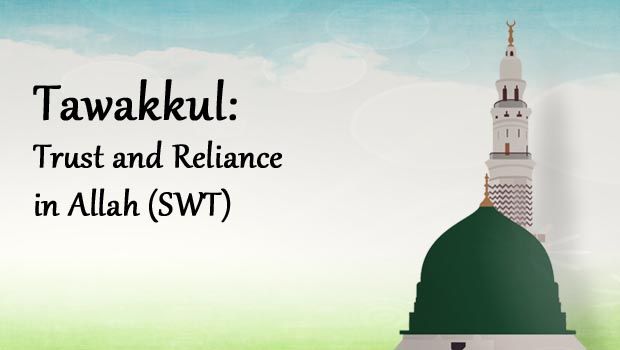Tawakkul means perfect reliance and trust. The root of tawakkul is wao-kaf-lam. One of the words derived from this root is wakil – the person whom we trust. The person who trusts someone is called mutawakkil. Naturally, every one of us wants the best wakil for guidance in all our affairs, and who could we trust more than our Creator, Allah (SWT)? In Surah Al-Imran, Allah (SWT) says, “Allah [alone] is sufficient for us, and He is the best Disposer of affairs” (Qur’an 3:173). Is anyone more capable to guide us than Allah (SWT)? But unfortunately, because of our weak eman, we put our trust in worldly sources of advice and assistance to resolve our problems. This includes, but is not limited to, visiting graves of saints, making du’as to dead people, putting one’s entire trust in a doctor or specific treatment for a cure. On the contrary, Allah (SWT) tells us in Surah Ibrahim, “And in Allah let the believers put their trust” (Qur’an 14:11).
In our everyday life, we should remember the meaning of tawakkul (trust) exhibited to us by the Prophet (pbuh).
Ibn Abass (RA) narrated that the Prophet (pbuh) said that he was shown a huge crowd of people and was told, “This is your nation out of whom seventy thousand shall enter paradise without reckoning.” Then the Prophet (pbuh) entered his house without telling his companions who they (the 70,000) were. So the people started to wonder about these 70,000. When the Prophet heard of their discussions, he came out and said, “Those people are those who do not treat themselves with amulets, nor do they believe in bad or good omens, nor do they get themselves branded [cauterized], but they put their trust in their Lord” (excerpted from a hadith in Sahih Bukhari). This is truly a great reward for the mutawakallen in the Hereafter. May Allah (SWT) make us one of them, ameen.
On the contrary, for people who depend on worldly means more than Allah (SWT), they may succeed in this dunya in terms of wealth or fame or other worldly accomplishments, but these are only temporary things which will vanish when they die or on the Day of the Judgment, whichever comes first. They will be held accountable for their deeds and have to face the torment as they excluded themselves from the list of believers who put trust in Allah (SWT) alone.
In Surah Al-Imran, Allah (SWT) says, “O you who believe! Fear Allah as He should be feared, and die not except in a state of Islam” (Qur’an 3:102). To die as a Muslim with complete submission to Allah (SWT), we have to follow the Qur’an and Sunnah, to try to be Ibad-ur-Rahman, servant of the Beneficent. We have to be like Yaqoob (AS) when his two sons Yusuf and Bin-Yameen were separated from him, instead of begging the rulers of the time, he turned to Allah (SWT), and said, “I expose my distress and anguish only onto Allah…” (Qur’an 12:86). This is the ideal behavior of a true believer as he is fully aware that for everything the final decision is from our Creator and Sustainer, Allah (SWT). We notice the firm conviction of Yaqoob (AS) in his trust in Allah as the story progresses. When his sons tell him about the allegation that Bin Yameen stole a cup and was detained in Egypt, he said, “So patience is most fitting! It may be that Allah will bring them all unto me. Lo! He, only He, is the Knower, the Wise” (Qur’an 12:83). Allah (SWT) responded to his trust by reuniting the entire family in Egypt.
When Ibrahim (pbuh) declared the truth that Allah (SWT) is the only one who deserves to be worshipped and He does not have any partners, his people decided to punish him by throwing him into the fire. According to the hadith in Sahih Bukhari (narrated by Ibn Abass), Prophet Ibrahim (pbuh) reacted by saying, “For us Allah suffices. He is the best disposer of affairs.” We are told that the angels of fire and rain were waiting for Allah’s orders to extinguish the fire, but Allah (SWT) directly spoke to the fire, “We said ‘O Fire, be cool and safe for Ibrahim (AS).’” Jabir (RA) narrated an incident that happened during the Dhat-ur-Riqa’ expedition. The Prophet (pbuh) was resting under a shady tree, and a non-believer sneaked up on him. He drew his sword and said to the Prophet who was at that moment unarmed, “Who will stop me from killing you now?” The Prophet peace be upon him answered, “Allah!” In one version of the hadith, the sword then fell from the man’s hand. This incident highlights the Prophet’s (pbuh) immense confidence and trust in Allah (SWT).
In our everyday life, we should remember the meaning of tawakkul (trust) exhibited to us by the Prophet (pbuh). He said to one of his companions, “Tawakkul means that you should tie your camel first and put your trust in Allah (SWT).” Definitely Allah (SWT) is the One who provides for us, but this does not mean that we simply sit idle and wait for miracles. Rather, we have to struggle in every aspect of our lives and then put our trust in Allah (SWT) for favorable results. To achieve these qualities, we must again turn to the Sunnah. According to the narration of Ibn Abbas (RA), the Prophet (pbuh) used to pray, “Allah, to You I have submitted and have become obedient; in You do I believe and in You do I seek my judgment. O Allah, I seek refuge with You through Your Honor; there is none worthy of worship except You alone that You safeguard me against deprivation. You are the eternal who never dies whereas human beings and jinns will all die” (Agreed upon).
May Allah (SWT) grant us wisdom to follow the verse from Surah Al-Ahzab, “And put your tawakkul in Allah, for Allah is Sufficient as a Wakil [trustee and disposer of affairs]” (Qur’an 33:3). May Allah (SWT) give us the tawfiq (good fortune) to have fullest conviction of Allah’s Lordship – and the patience and thankfulness that are yielded from that conviction – to be, each one of us, a mutawakkil. Ameen.






